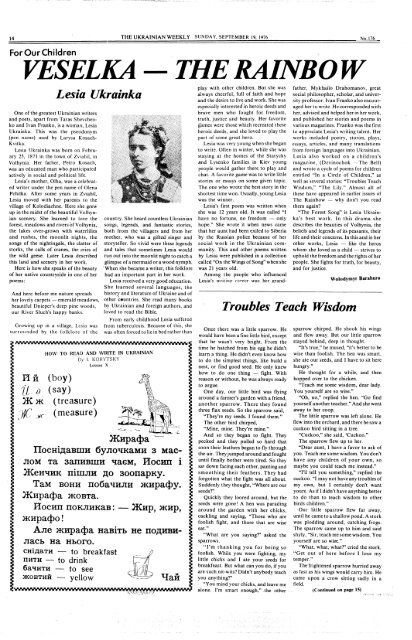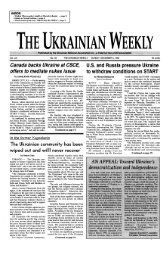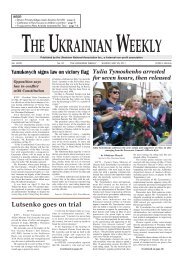The Ukrainian Weekly 1976
The Ukrainian Weekly 1976
The Ukrainian Weekly 1976
Create successful ePaper yourself
Turn your PDF publications into a flip-book with our unique Google optimized e-Paper software.
14 THE UKRAINIAN WEEKLY SUNDAY, SEPTEMBER 19, <strong>1976</strong> No. 176<br />
For Our Children<br />
VESELKA - THE RAINBOW<br />
Lesia Ukrainka<br />
One of the greatest <strong>Ukrainian</strong> writers<br />
and poets, apart from Taras Shevchenko<br />
and Ivan Franko, is a woman, Lesia<br />
Ukrainka. This was the pseudonym<br />
(pen name) used by Larysa Kosach-<br />
Kvitka.<br />
Lesia Ukrainka was born on February<br />
25, 1871 in the town of Zviahil, in<br />
Volhynia. Her father, Petro Kosach,<br />
was an educated man who participated<br />
actively in social and political life.<br />
Lesia's mother, Olha, was a celebrated<br />
writer under the pen name of Olena<br />
Pchilka. After some years in Zviahil,<br />
Lesia moved with her parents to the<br />
village of Kolodiazhne. Here she grew<br />
up in the midst of the beautiful Volhynian<br />
scenery. She learned to love the<br />
forest, meadows and rivers of Volhynia,<br />
the lakes over-grown with waterlilies<br />
and rushes, the moonlit nights, the<br />
songs of the nightingale, the clatter of<br />
storks, the calls of cranes, the cries of<br />
the wild geese. Later Lesia described<br />
this land and scenery in her work.<br />
Here is how she speaks of the beauty<br />
of her native countryside in one of her<br />
poems:<br />
And here before me nature spreads<br />
her lovely carpets — emerald meadows,<br />
beautiful Dnieper's deep pine woods,<br />
our River Sluch's happy banks.<br />
Growing up in a village, Lesia was<br />
surrounded by the folklore of the<br />
HWWWUWWU^<br />
country. She heard countless <strong>Ukrainian</strong><br />
songs, legends, and fantastic stories,<br />
both from the villagers and from her<br />
mother, who was a gifted singer and<br />
storyteller. So vivid were these legends<br />
and tales that sometimes Lesia would<br />
run out into the moonlit night to catch a<br />
glimpse of a mermaid or a wood nymph.<br />
' When she became a writer, this folklore<br />
had an important part in her work.<br />
Lesia received a very good education.<br />
She learned several languages, the<br />
history and literature of Ukraine and of<br />
other countries. She read many books<br />
by <strong>Ukrainian</strong> and foreign authors, and<br />
loved to read the Bible.<br />
From early childhood Lesia suffered<br />
from tuberculosis. Because of this, she<br />
was often forced to lie in bed rather than<br />
HOW TO READ AND WRITE IN UKRAINIAN<br />
By 1. KORYTSKY<br />
Lesson X<br />
Йй (boy)<br />
U u ( sa y)<br />
Ж ж (treasure)<br />
ІС ж (measure)<br />
Жирафа ^<br />
Поснідавши булочками з маслом<br />
та запивши чаєм, Йосип і<br />
Женчик пішли до зоопарку.<br />
Там вони побачили жирафу.<br />
Жирафа жовта.<br />
Йосип покликав: — Жир, жир,<br />
жирафо!<br />
Але жирафа навіть не подивилась<br />
на нього.<br />
снідати - to breakfast<br />
пити - to drink<br />
бачити — to see<br />
жовтий - yellow ^ZM^ -qag<br />
WWWWWWWWVWWWWWWWW^^<br />
play with other children. But she was<br />
always cheerful, full of faith and hope<br />
and the desire to live and work. She was<br />
especially interested in heroic deeds and<br />
brave men who fought for freedom,<br />
truth, justice and beauty. Her favorite<br />
games were those which recreated these<br />
heroic deeds, and she loved to play the<br />
part of some great hero.<br />
Lesia was very young when she began<br />
to write. Often in winter, while she was<br />
staying at the homes of the Starycky<br />
and Lysenko families in Kiev young<br />
people would gather there to play and<br />
chat. A favorite game was to write little<br />
stories or essays on some given topic.<br />
<strong>The</strong> one who wrote the best story in the<br />
shortest time won. Usually, young Lesia<br />
was the winner.<br />
Lesia's first poem was written when<br />
she was 12 years old. It was called "I<br />
have no fortune, no freedom — only<br />
hope." She wrote it when news came<br />
that her aunt had been exiled to Siberia<br />
by the Russian police because of her<br />
social work in the <strong>Ukrainian</strong> community.<br />
This and other poems written<br />
by Lesia were published in a collection<br />
called "On the Wings of Song" when she<br />
was 21 years old.<br />
Among the people who influenced<br />
Lesia's writing career was her grand-<br />
Once there was a little sparrow. He<br />
would have been a fine little bird, except<br />
that he wasn't very bright. From the<br />
time he hatched from his egg he didn't<br />
learn a thing. He didn't even know how<br />
to do the simplest things, like build a<br />
nest, or find good seed. He only knew<br />
how to do one thing — fight. With<br />
reason or without, he was always ready<br />
to argue.<br />
One day, our little bird was flying<br />
around a farmer's garden with a friend,<br />
another sparrow. <strong>The</strong>re they found<br />
three flax seeds. So the sparrow said,<br />
"<strong>The</strong>y're my seeds. I found them."<br />
<strong>The</strong> other bird chirped,<br />
"Mine, mine. <strong>The</strong>y're mine."<br />
And so they began to fight. <strong>The</strong>y<br />
pecked and they pulled so hard that<br />
soon their feathers began to fly through<br />
the air. <strong>The</strong>y jumped around and fought<br />
until finally bother were tired. So they<br />
sat down facing each other, panting and<br />
smoothing their feathers. <strong>The</strong>y had<br />
forgotten what the fight was all about.<br />
Suddenly they thought, "Where are our<br />
seeds?"<br />
Quickly they loored around, but the<br />
seeds were gone! A hen was parading<br />
around the garden with her chicks,<br />
cackling and saying, "Those who are<br />
foolish fight, and those that are wise<br />
eat."<br />
"What are you saying?" asked the<br />
sparrows.<br />
"I'm thanking you for being so<br />
foolish. While you were fighting, my<br />
little chicks and I ate your seeds for<br />
breakfeast. But what can you do, if you<br />
are such nit-wits? Didn't anybody teach<br />
you anything?"<br />
"You mind your chicks, and leave me<br />
alone. I'm smart enough^' the other і<br />
father, Mykhailo Drahomanov, great<br />
social philosopher, scholar, and university<br />
professor. Ivan Franko also encouraged<br />
her to write. He corresponded with<br />
her, advised and helped her in her work,<br />
and published her stories and poems in<br />
various magazines. Franko was the first<br />
to appreciate Lesia's writing talent. Her<br />
works included poetry, stories, plays,<br />
essays, articles, and many translations<br />
from foreign languages into <strong>Ukrainian</strong>.<br />
Lesia also worked on a children's<br />
magazine, (Dzvinochok —<strong>The</strong> Bell)<br />
and wrote a cycle of poems for children<br />
entitled "In a Circle of Children," as<br />
well as several stories: "Troubles Teach<br />
Wisdom," "<strong>The</strong> Lily." Almost all of<br />
these have appeared in earlier issues of<br />
<strong>The</strong> Rainbow — why don't you read<br />
them again?<br />
"<strong>The</strong> Forest Song" is Lesia Ukrainka's<br />
best work. In this drama she<br />
describes the beauties of Volhynia, the<br />
beliefs and legends of its peasants, their<br />
life and their concerns. In this and in her<br />
other works, Lesia — like the heros<br />
whom she loved as a child — strives to<br />
uphold the freedom and the rights of her<br />
people. She fights for truth, for beauty,<br />
and for justice.<br />
Wolodymyr Barahura<br />
Troubles Teach Wisdom<br />
sparrow chirped. He shook his wings<br />
and flew away. But our little sparrow<br />
stayed behind, deep in thought.<br />
"It's true," he mused, "it's better to be<br />
wise than foolish. <strong>The</strong> hen was smart,<br />
she ate our seeds, and I have to sit here<br />
hungry."<br />
He thought for a while, and then<br />
hopped over to the chicken.<br />
"Teach me some wisdom, dear lady.<br />
You yourself are so wise."<br />
"Oh, no," replied the hen. "Go find<br />
yourself another teacher." And she went<br />
away to her coop.<br />
<strong>The</strong> little sparrow was left alone. He<br />
flew into the orchard, and there he saw a<br />
cuckoo bird sitting in a tree.<br />
"Cuckoo," she said, 'Cuckoo."<br />
<strong>The</strong> sparrow flew up to her.<br />
"Dear aunt, I have a favor to ask of<br />
you. Teach me some wisdom. You don't<br />
have any children of your own, so<br />
maybe you could teach me instead."<br />
"I'll tell you something," replied the<br />
cuckoo. "I may not have any troubles of<br />
my own, but I certainly don't want<br />
yours. As if I didn't have anything better<br />
to do than to teach wisdom to other<br />
birds children."<br />
Our little sparrow flew far away,<br />
until he came to a shallow pond. A stork<br />
was plodding around, catching frogs.<br />
<strong>The</strong> sparrow came up to him and said<br />
shyly, "Sir, teach me some wisdom. You<br />
yourself are so wise."<br />
"What, what, what?" cried the stork.<br />
"Get out of here before I lose my<br />
temper."<br />
<strong>The</strong> frightened sparrow hurried away<br />
as fast as his wings would carry him. He<br />
came upon a crow sitting sadly in a<br />
field.<br />
(Continued on page 15)

















